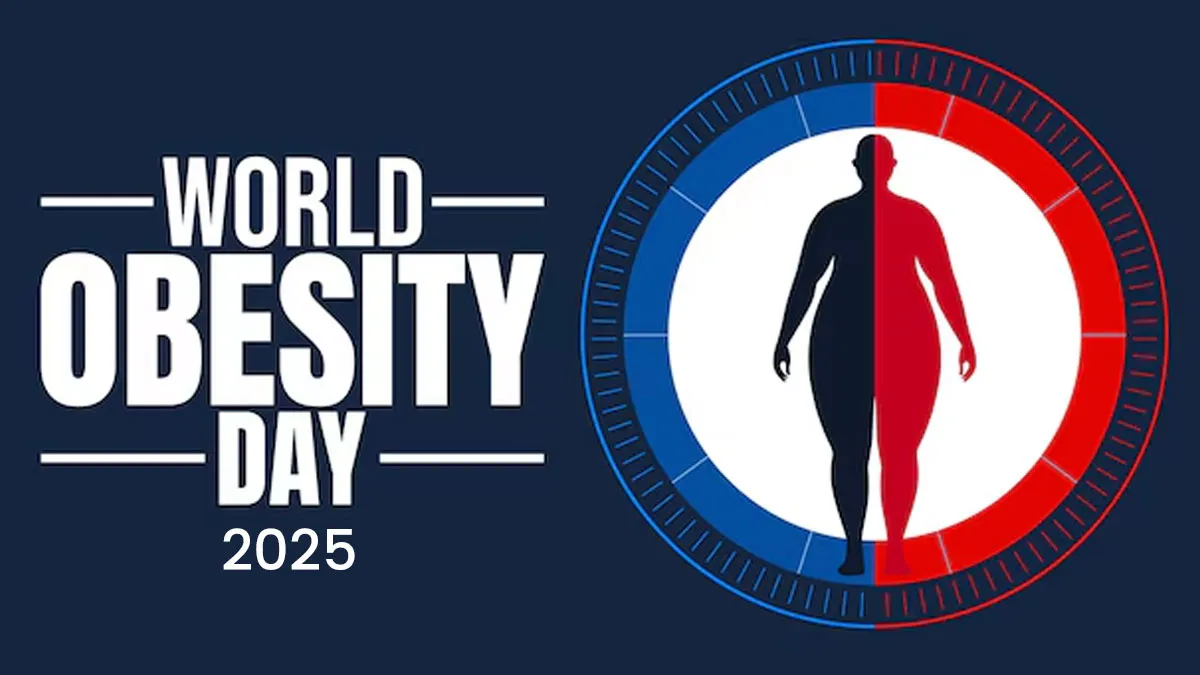
The celebration of World Obesity Day takes place annually on March 4 with the goal to inform people about expanding obesity problems worldwide and foster solutions to mitigate the problem. Obesity serves as a complex chronic health disease that facilitates additional major medical problems including diabetes together with heart disease and cancer. World Obesity Day functions by uniting governments and communities with individuals to develop a future where all people receive equitable care as well as prevention strategies.
Table of Content:-
World Obesity Day 2025 Theme
-1741060855569.jpg)
The World Health Organization (WHO) announced the World Obesity Day 2025 theme as ‘Building a Healthy Future: Tackling Obesity Through Prevention and Care.’ The theme emphasises the requirement for a fundamental health system, food environment, and public policy reforms that would allow effective obesity control. This year's theme underscores the need for systemic changes across multiple sectors.
It calls for reforms in healthcare systems to ensure equitable access to obesity prevention and treatment services. Additionally, it advocates for modifications in food environments to promote healthier dietary choices by regulating unhealthy food marketing and increasing access to nutritious food options.
The History of World Obesity Day

The World Obesity Federation created World Obesity Day, which started in 2015 as its inaugural launch. The organisation introduced the day with the dual purpose of finding solutions to the obesity crisis as well as improving global prevention and treatment policies. Through social media campaigns and events, the campaign has expanded substantially to involve millions of people worldwide. The yearly theme directs attention toward particular obesity-related issues that evolve with each cycle of World Obesity Day.
Throughout past events, the campaign has focused on different thematic topics, which have covered ‘Childhood Obesity’ and ‘Treat Obesity Now and Avoid Consequences Later.’ The day serves as a platform for advocacy, education, and collaboration between governments, organisations, and individuals.
ALSO READ: What Happens to Your Body When You Stop Snacking? Nutritionist Shares Tips To Adjust Hunger
The Significance of World Obesity Day
-1741060893660.jpg)
Obesity is one of the most pressing public health challenges globally. According to the World Health Organization (WHO), more than 1 billion people worldwide are obese as of recent estimates—650 million adults, 340 million adolescents, and 39 million children. This number continues to rise due to unhealthy diets, lack of physical activity, and systemic inequities in healthcare access.
Obesity is linked to numerous noncommunicable diseases (NCDs), including type 2 diabetes, cardiovascular diseases, certain cancers, and mental health issues. It also has significant socio-economic implications, as it disproportionately affects low-income and middle-income countries, where access to healthy food and healthcare is limited.
Dr M Manisegaran, Consultant Surgical Gastroenterologist-Minimal Access Surgery, Bariatric, Metabolic and Robotic Surgery, Yashoda Hospitals, Hyderabad, explains it as a health issue that raises the chance of conditions like heart disease, diabetes, high blood pressure, and several malignancies. He explained that obesity gradually worsens or leads to many health problems. These include type-2 diabetes, high blood pressure, unhealthy cholesterol levels, heart disease, liver issues, breathing and bone problems, difficulty having children, mental health challenges, and certain types of cancer
A Study Highlighting the Crisis
-1741060983734.jpg)
A recent WHO study revealed alarming trends: by 2025, around 167 million people—adults and children—are expected to experience health complications due to being overweight or obese. Additionally, in some regions like the Eastern Mediterranean, nearly 60% of adults are either overweight or obese. This highlights how environmental factors, such as poor urban planning (limiting physical activity) and the pervasive marketing of unhealthy foods, contribute significantly to this crisis.
The study also emphasised that early intervention is key. Good nutrition during pregnancy and breastfeeding can help prevent childhood obesity. Furthermore, creating safe spaces for physical activity in urban areas and regulating the advertising for high-fat or sugary foods are essential steps toward reversing this trend.
How the Theme for 2025 Inspires Action
-1741060917056.jpg)
The main emphasis of this year centres on redistributing accountability from individuals to organisations and systems. The theme calls for comprehensive healthcare policy changes, enhancements in food environment policies as well as school and workplace environments and media regulation. The government needs to enact policies including pricing sugar-based drinks, providing economical support for healthy food, and ensuring equal healthcare services for weight management. Communities should establish protected routes for pedestrians and cyclists and work together to teach health-related knowledge to young individuals.
ALSO READ: Does Lemon Water Burn Belly Fat? Expert Reacts To The Myth
Conclusion
World Obesity Day 2025 emphasises that fighting obesity demands community-wide collaboration across every level of society. A combination of systemic policy reforms aimed at preventing obesity and providing necessary healthcare will lead to decreased global prevalence of obesity-related diseases. This day lets us acknowledge past failures while initiating strategic actions to establish a healthier future for everyone.
Also watch this video
How we keep this article up to date:
We work with experts and keep a close eye on the latest in health and wellness. Whenever there is a new research or helpful information, we update our articles with accurate and useful advice.
Current Version